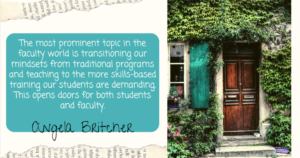
Multi-Faculty Collaboration to Design Online General Studies Courses
In the face-to-face classroom, each faculty member typically designs and teaches their own course with minimal input from departmental colleagues. Reflective of this approach, many

In the face-to-face classroom, each faculty member typically designs and teaches their own course with minimal input from departmental colleagues. Reflective of this approach, many

One of the most intriguing, and perhaps intimidating, aspects of walking into a class for the first time and introducing yourself is deciding who you

There’s no discounting the importance of the first day of class. What happens that day sets the tone for the rest of the course. Outlined

A very short trip to a time long ago J. R. R. Tolkien’s famous 1937 fantasy book, The Hobbit, introduces among its heroes a fierce

As faculty, we want our students to achieve, but more than that we want our students to see, at least in some way, that what

To: My Students From: Your Teacher Re: What’s happening in college—is it real? I just read about a senior engineering student who was presenting a

This week on The Focus is You, we’re getting to know Angela Britcher who works in instructional design, faculty training, and content writing. We’ve catered

This article is featured in the resource guide, Effective Online Teaching Strategies. Prior to every course, faculty should consider how they can connect with their

A common practice at many colleges and universities involves course faculty inviting librarians into their classrooms to teach research and information literacy skills and concepts

Our “office hours off campus” idea transpired from a speech given by Dr. Iain Campbell at a publisher’s workshop we attended. Dr. Campbell teaches large
Get exclusive access to programs, reports, podcast episodes, articles, and more!